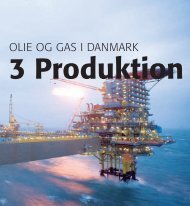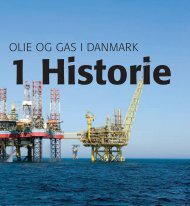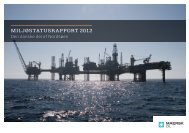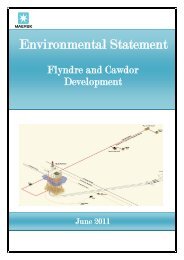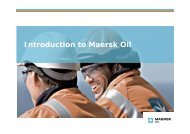Environmental Statement - Maersk Oil
Environmental Statement - Maersk Oil
Environmental Statement - Maersk Oil
Create successful ePaper yourself
Turn your PDF publications into a flip-book with our unique Google optimized e-Paper software.
A ‐ 4<br />
Marine and Coastal Access Act 2009 (as<br />
amended 2012)<br />
Marine (Scotland) Act 2010 (as amended<br />
2011)<br />
Balloch Field Development <strong>Environmental</strong> <strong>Statement</strong><br />
Appendix A – Review of Legislation<br />
The Marine and Coastal Access Act (MCAA) came into force in November 2009. The Act covers all UK waters except<br />
Scottish internal and territorial waters which are covered by the Marine (Scotland) Act (2010), which mirrors the MCAA<br />
powers. Licensing provisions in relation to MCAA came into force on 1 st April. The marine licensing provisions in Part 4<br />
replace the licensing and consent controls previously exercised under Part II of the Food and Environment Protection Act<br />
1985 and Part II of the Coast Protection Act 1949. The considerations built into these regimes are merged into the new<br />
regime, with some modifications. The export of cuttings or produced water to another site for reinjection continues to<br />
be licensed under FEPA Part II. All activities associated with exploration or production / storage operations that are<br />
authorised under Petroleum Act or Energy Act are exempt from the requirements of MCAA. Specifically, the following<br />
activities are exempt from MCAA as they are controlled under different legislation:<br />
Activities associated with exploration or production / storage operations that are authorised under the<br />
Petroleum Act 1998 and Energy Act 2008<br />
Additional activities authorised solely under the DECC environmental regime, such as chemical and oil<br />
discharges<br />
The offshore oil and gas activities that will require an MCAA licence are as follows:<br />
Deposits of substances or articles in the sea or on the seabed, e.g. pipeline crossing works prior to use of<br />
pipeline authorisation works (PWA) or related Direction, or deposit of materials associated with abandonment<br />
operations<br />
Removal of substances or articles from the seabed, e.g. pre‐sweep dredging with disposal of material at a<br />
remote location, or removal of seabed infrastructure during abandonment operations<br />
Disturbance of the seabed, e.g. pre‐sweep dredging using a levelling device or by side‐casting material, or<br />
disturbance of sediments or cuttings pile by water jetting during abandonment operations<br />
Installation of certain types of cable that cannot be covered by a PWA e.g. communication cables<br />
Deposit and use of explosives that cannot be covered under an application for a Direction, e.g. during<br />
abandonment operations<br />
Decommissioning operations are not exempt and will require a Marine licence.<br />
MCAA includes navigational provisions, but as described above, virtually all activities associated with exploration or<br />
production/storage operations will not require Marine licences. Therefore the provisions of the Coast Protection Act<br />
were transferred to the Energy Act 2008 Part 4A via the MCAA to cover navigation considerations relating to exploration<br />
or production/storage operations.<br />
Licences will be valid for a maximum period of one year however; applications for licence renewals can be made.




